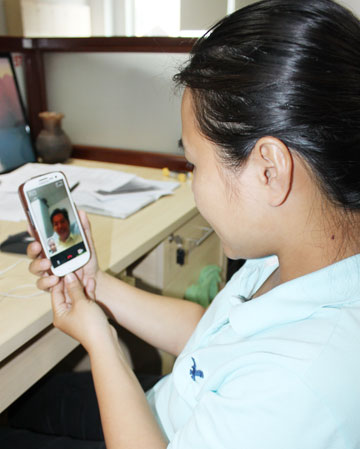VietNamNet Bridge – If Vietnamese mobile network operators still keep following the old way, they would lose the market shares into the hands of free phone call apps.

The apps allowing smart phone users to send messages and make calls free of charge have become well-known to people.
Nguyen Thanh Truong, an office worker in HCM City, said he always uses Viber to chat with friends or make fall calls, because wi-fi is available at both his office and at home.
The tool can be used among the users who have installed Viber and kept online regularly with wi-fi or 3G.
The Viber’s expansion…
In September 2012, Viber, the world’s most popular free messaging and calling app, stated that it had had 100 million users after two months since the day of making debut.
The statement means that Viber has deprived 1.5 billion minutes of calls and 2 billion messages of mobile phone network operators worldwide.
Ovum, a market survey firm, has released a report, showing that telcos lost 14 billion dollars just within one year 2011, because clients have shifted from SMS service to messaging via Internet.
The free messaging and calling apps like Skype, Whatsapp, Viber and Tango, have also been applied in Vietnam in a large scale. Besides, some Vietnamese apps like Wala, Zalo (VNG) have also become popular. These are the apps allowing send messages and make calls free of charge which can be easily downloaded by the users of the smart phones running on Android or iOS.
Wala alone, has reported the 15,000 downloads just after one month of launching. Every day, the app users download more than 4000 pictures and make 40,000 comments. The figures are believed to increase sharply by early 2013, when Chat Voice and some other apps hit the market.
Most of the big mobile network operators have announced that they have had 3G networks covered in nearly all provinces and cities. In Vietnam, the country that wi-fi is available at every small café, experts say, it would be even easier for the free apps to expand their influences.
In the central city of Da Nang, for example, wi-fi has been provided free of charge all over the city in an effort to promote tourism. As such, someone just needs to buy a low cost smart phone, and he now can think of stopping buying phone cards.
… would threaten others
The representative of US AT&T network said 2/3 of mobile phone users in the US are using smart phones, and that Viber and other free calling apps have caused a big loss to the network.
Meanwhile, Vietnamese mobile network operators still keep calm over the threat from the apps.
The executives from both Viettel and MobiFone, the two of the three biggest mobile network operators in Vietnam, said Vietnamese smart phone users have just begun got familiar to Viber and other apps. However, since the connection quality remains unstable, there’s no need to be too worried about the rivals.
However, the representative of Viettel said Viettel would apply necessary measures to attract more customers. He also said that it’s highly possible that Viber would grow strongly, and if so, this would cause a big war in the telecom market.
Phan Cam Tu, the representative of Gmobile, also thinks that free apps would not be a big threat for now.
Tu said that users need to have smart phones, wi-fi or 3G to utilize the free apps. Meanwhile, only 10 percent of mobile phones in Vietnam are smart phones.
PL TP HCM